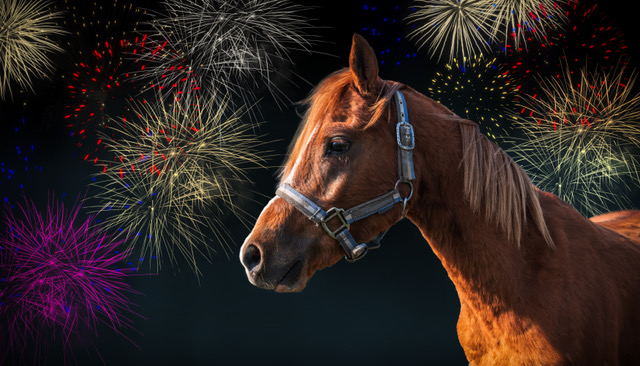Independence Day Safety and Horses
By Brian S. Burks, DVM, Diplomate, ABVP, Board Certified in Equine Practice
Horses are fight or flight creatures; when scared they most often try to get away from the source of fear. Fourth of July fireworks can be loud and bright, causing a fear reaction in some horses. For these horses, finding a way to mitigate human celebrations is necessary to prevent self-injury and even escape.
Keeping the horse inside his stall reduces the impact of noise and may make him feel safe. It is not advisable, however, to take a horse used to being outside constantly and putting him in a stall for this one night without making him accustomed to a stall for several days or weeks. Herd-bound horses should likewise not be separated unless they are used to such separation. Most horses do better with a buddy. Stalls should be checked for any hazards such nails, screws, or sharp edges on which the horse could injure himself if he begins to circle in the stall.
Keeping food in front of horses is important and may help divert his attention. Music at a moderate level can drown out noise from fireworks. Ear plugs can also be used to help reduce noise.
Sedatives, such as acepromazine, can be administered orally or by injection but ace has only mild sedative effects and must be given at least 20-30 minutes in advance. Waiting until your horse is panicked and then giving acepromazine, or other tranquilizers, will have little, if any, effect.
Some herbal supplements, especially those containing valerian and/or magnesium may offer some calming effects, but it is best to start them several days in advance so levels can build up. If you are actively competing this summer, remember that these supplements might include prohibited substances in show horses.
Suggestions for a safe holiday with your horse:
- Evaluate your horse’s fireworks history. Some horses have a surprising lack of interest and fear when it comes to fireworks, especially if their owner and herd mates are calm.
- If your horse has a history of being stressed and scared, talk with your veterinarian about calming supplements or prescribing a sedative.
- Know when and where the big firework shows are going to be and plan accordingly. If your neighbors tend to put on big displays, talk with them about what time they are planning on starting and where they are going to be staging the show.
- Stage fireworks in a location away from your horses, barn, and hay. This will help minimize the risk of scaring your horse and prevent potential fires from sparks or misaimed fireworks.
- Make sure you have fire safety procedures in place and fire extinguishers and water hoses handy, just in case. If your horse is boarded, check with the facility owner or manager to see that they have safety procedures in place.
- Make sure fencing, gates and doors are secure and in good repair. Nothing could be worse than a horse running panicked down the street or through a fence. Make sure you have current photos just in case they do get out (microchips can also be helpful for identification).
- Keep your horse with their friends. A calm horse can help provide comfort to a horse that is worried and boost their confidence.
- Keep your horse in familiar surroundings. Identify where your horse is most comfortable and keep them there. If there is a chance, they will get scared and run, keep them in a confined area, such as a stall.
- Consider taking your horse to another facility if there is going to be a massive firework display or a lot of neighbors shooting them off near your barn. Find somewhere that your horse will be comfortable, especially if they are not used to traveling.
- Do not ride during the fireworks, even in an indoor arena. This is just asking for trouble!
- Use equine ear plugs or ear puffs to help muffle loud noises. (Make sure you train your horse to accept them before the 4th!)
- Keep them occupied with extra hay or a slightly delayed dinner. Food can be a great distraction!
- Play soothing music (preferably classical or traditional country) to help drown out the loud noises (but make sure your horse is not too stressed by loud music).
- Keep the lights on. This will help minimize the flashes of light the horse experiences when fireworks are exploding.











